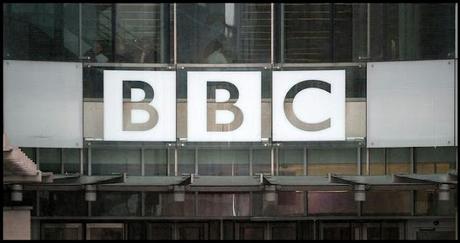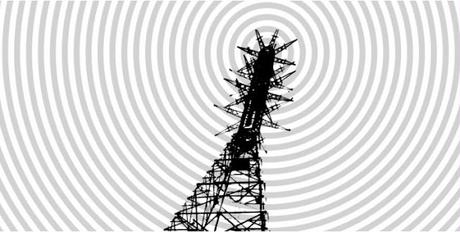Then along came that execrable woman Nadine Dorries (ironically Boris Johnson's latest Secretary of State for Culture), trying to deflect the flack from her beloved PM in his ignominy, by targeting the BBC in another round of Tory warmongering against the Corporation. That's it, I thought. I've had enough of this BBC-bashing.
I'm nailing my colours firmly to the BBC radio mast in today's blog and celebrating its achievements, charter and worth to the nation. Licensed broadcasting commenced one hundred years ago, in October 1922. Originally this was radio transmission only and was initiated by a consortium of private wireless' manufacturers. Take up was slow and sporadic, which is why the British Broadcasting Corporation was conceived and given a Royal Charter in 1927. Television transmission joined radio programming from 1929 onwards and the service was publicly funded via a license fee mechanism, allowing the service to be free from 'commercial' bias and constraints. The BBC was the first, and in my estimation, it remains the finest public service broadcasting (PBS) organisation in the world, the womb from which the best of British civilizing cultural and social values emerged through the 20th century. We should be as proud and protective of it as we are of that other great social institution, the NHS.

The license fee has always been set by the government of the day and approved by parliament. Effectively, it is a form of voluntary taxation. Originally it was payable at a rate of 10 shillings (or 50 pence) per year for radio sets only by any household, school, hospital or workplace that possessed radio sets. After world war II the fee was increased to £2 per year for any household or institution possessing one or more television sets. From 1971 the radio component was dropped.
The monies raised annually by the TV license fee cover 75% of the costs of the BBC. (The other 25% comes from sales of programmes around the world.) It should be borne in mind that this funding covers a vast range of activities and services: not only the many national and regional BBC television channels, their staff, studios, productions, technicians and transmissions, but also an even greater network of national, regional and local radio stations (staff, studios, productions et cetera), a fantastic Education division putting together programmes for schools and colleges, a worldwide network of professional news reporters, the BBC World Service, and now in the internet age, great state of the art online content covering news, arts, sport, music and much else. Personally, I think that's incredible value for money...the current cost of the license fee working out at 43 pence per day!
Of course, recent Conservative governments have not looked kindly on the BBC. They don't like State enterprises on principle (there are no vast profits to be made there) and they feel the BBC has been unfairly biased against them - though the Corporation is duty-bound to remain apolitical, so that's simply a case of Tories not liking just criticism. The Conservative government has also tried to show the BBC in a bad light over the ending of free TV licenses for the over-75s, turning the institution into a political football. When it was announced that the free license scheme was being scrapped and that the over-75s would have to pay in future, this was portrayed in the right-wing press as heartlessness by the BBC, when in fact the subsidy - which has been in place for decades - is a government subsidy, that the Tories have suddenly decided to revoke. It's not the BBC that are the bad guys here but Boris Johnson's government.
And now Nadine Dorries has decided that the license fee will no longer increase in line with inflation, so that's another constraint on the Corporation in advance of its Royal Charter being up for review/ revision in 2027, with the strong hint that the license fee may be abolished all together.
Quite how the BBC will be able to continue to operate as the finest public service broadcasting organisation in the world much after its centenary is unclear to me. If it falls before the Tory onslaught to privatise and exploit every part of this country's infrastructure (as has happened with the deregulation and sell off in communications, energy, transport, utilities and is targeted to happen to health as well), then most of the institutions that have made this country great will have been decimated on the altar of petty greed. It's not a pretty prospect.

To finish, a new poem, not my finest effort by a margin, but intended to be evocative of those days in the late 1950s and early 1960s when most children whose families possessed a (black and white) TV set would watch what was on offer between getting home from school and teatime. It may get upgraded over time, but here's take one...Hey Presto!of course the world's not monochromethough little we cared when we got home from school,hit the on button to let the set warm upand dropped to the floorin that magical hour before teato stare in mesmerised wonderat such fare as voiced-over animalsfrom Bristol Zoo, puppets on stringsmounting International Rescues, quiz shows with cabbages as booby prizes,cowboys and indians, Judys in disguises,singing piglets and talking horses,all beamed through the airwavesfrom transmitter to aerial until they emerged in our living roomsto cast their spell on our rented TVs(nobody bought their own in those days)with flickering 405 or 625 lines thrown up onto the screen from a cathode ray tube,binary choices, only two channels,received pronunciation voicing the nation,fuelling our imaginations, educating while entertaining - and always turned offbefore we sat down to eat...By the way, I've ordered myself a second-hand DVD copy of The Matrix, so I will watch the film when it arrives. I wonder if DVDs have a matrix number. Thanks for reading, S ;-) Email ThisBlogThis!Share to TwitterShare to Facebook
